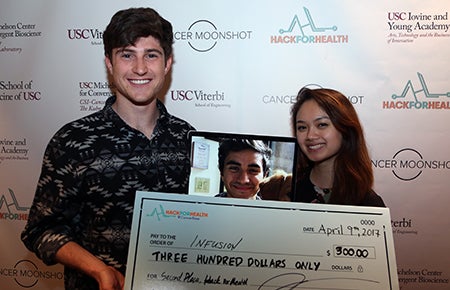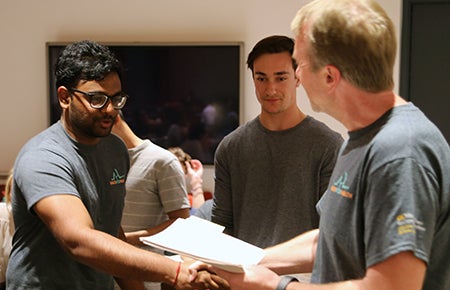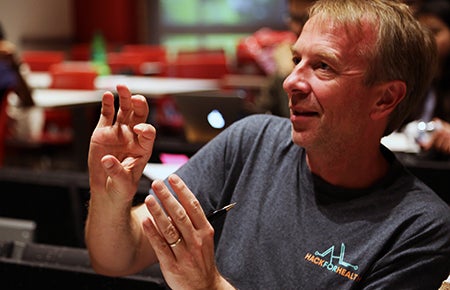
Students hack high-tech solutions for cancer patients
Serhan Ulkumen left his team and went home early. The USC Dornsife junior wasn’t feeling well, and he worried the condition might worsen. So, he reluctantly decided to leave his teammates, letting them finish the work they had begun the evening before.
Ulkumen, along with Brian Cohn, a Ph.D. student at USC Viterbi School of Engineering, and UCLA design media arts student Deanna Lam — collectively “Infusion” — had been participating in USC’s inaugural Hack For Health.
The brain child of USC Viterbi alumna Thuy Truong, the event took place April 7–9. Nine teams of students from USC and other schools each aimed to produce technological solutions for cancer patients during the three-day “hackathon” of innovation.
Team Infusion was working on an app that was inspired by Ulkumen himself. It’s a smart calendar designed to help others in situations similar to his.
Ulkumen is a cancer patient undergoing chemotherapy.

Hackathon second-place winners Brian Cohn and Deanna Lam present their award while holding a photo of teammate Serhan Ulkumen.
Diagnosed with Hodgkin lymphoma last November, he has had bi-weekly infusions of anticancer drugs since December. The medicines are powerful, and they come with debilitating side effects including nausea, headache and fatigue.
The illness that drove the neuroscience major home that day stemmed from an infusion he had received the previous Tuesday. His decision to leave proved wise. The malaise quickly escalated after he arrived home, and he ended up in the emergency room later that night.
“It’s actually the worst that my side effects have been,” said Ulkumen, who recovered shortly after.
Finding a solution
When Ulkumen and his teammates began the hackathon, they, like other participants, spoke with patients and physicians who described the challenges of living with cancer. They also heard from former Director of Experience Design for the White House Cancer Moonshot Kara DeFrias, patient advocate AnneMarie Ciccarella and other notable experts who gave keynote speeches.
What they learned jibed with Ulkumen’s experience: Side effects of treatment can interfere with important events such as birthdays, weddings, graduations — even hackathons.
“I end up having to schedule my life around the chemotherapy, and not just the infusion dates but also the effect that it’s having on my body after that,” Ulkumen said.
The team set about designing an app that allows patients to input their treatment appointments as well as the dates of important social events. Patients also note any side effects or adverse events they experience between treatments. The eponymous app then can display patterns showing when various symptoms begin, peak and subside after infusions.

Contestant Deydeep Kothapalli, a biological sciences major, accepts a certificate of appreciation from Peter Kuhn.
“Infusion is an application that allows you to stay on top of your chemo regimen by tracking your side effects and adverse events, and then figuring out how they repeat over time,” Cohn said during his presentation to the hackathon judges on the final day. “So you can actually predict how you’re probably going to feel on any day in the future over the entire course of treatment.”
Cohn and Lam demonstrated the prototype app they had brought to fruition in less than 72 hours, displaying an impressive array of features including simple menus, a graphic display of symptoms over time and a calendar integrating that information.
They explained that patients could work with their treating physicians to plan around important events, something they had learned was a priority for patients.
“Infusion empowers patients by letting them use their data to find a balance between life and chemotherapy,” Lam said.
A winning team effort
In the end, the team’s insightful, creative work earned them second place, $300 and the opportunity to continue developing the app under the guidance of Peter Kuhn, Dean’s Professor of Biological Sciences and professor of medicine, biomedical engineering, and aerospace and mechanical engineering, and Truong, who now works with Kuhn on his Convergence Science Initiative – Cancer (CSI-Cancer).
Hackathon prizes and fellowships were provided by an anonymous donation designed to bring data analytics and crowdsourced data to patient benefit, according to Kuhn, who is also associate director of the Bridge Institute at the USC Michelson Center for Convergent Bioscience.

Dean’s Professor Peter Kuhn served as a judge for the Hack for Health event.
Kuhn, along with DeFrias, Jorge Nieva of USC Norris Comprehensive Cancer Center, Dean Erica Muhl of USC Iovine and Young Academy, and Lawrence Lau of USC Stevens Center for Innovation served as a hackathon judge.
Kuhn said he was impressed with how effectively Infusion and the other teams worked.
“They set an amazing pace of going from the ‘why’ to the ‘how’ to the ‘what’ and prepping to iterate,” he said, noting how they worked quickly to come up with concepts, build them and then improve on them rapidly over the weekend.
Kuhn also noted how each team’s app was designed to eventually work with CancerBase, a data sharing-driven initiative that connects cancer patients and care providers and that he co-created. The platform is part of former Vice President Joe Biden’s Cancer Moonshot.
“They all plugged into CancerBase as an ecosystem, which will expand that technology for the benefit of patients,” Kuhn said.
Just the beginning
Team Infusion will continue to work on their app for the next six months as Michelson CSI-Cancer Fellows, led by Truong and academically mentored by Kuhn while being guided by an ongoing engagement with patients and physicians. They will be joined by the other winning teams, CanCure, who took first place with an app that enables patients to track their medications, and Care Recruiter, who came in third with an app to help patients enroll in clinical trials.
For Ulkumen, who put his studies on hold while undergoing treatment but will return to USC Dornsife in the fall, the hackathon proved to be a moving experience.
“I’ve been feeling like my life has been on standby and that’s part of the reason I’ve wanted to do this hackathon,” he said. “I’ve been inspired to do something again.”